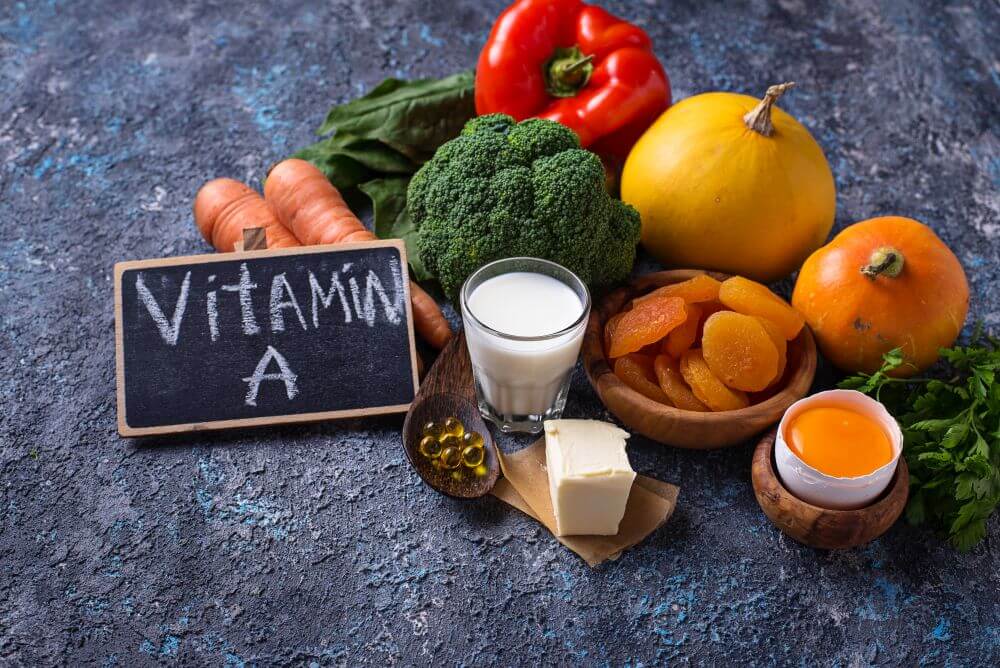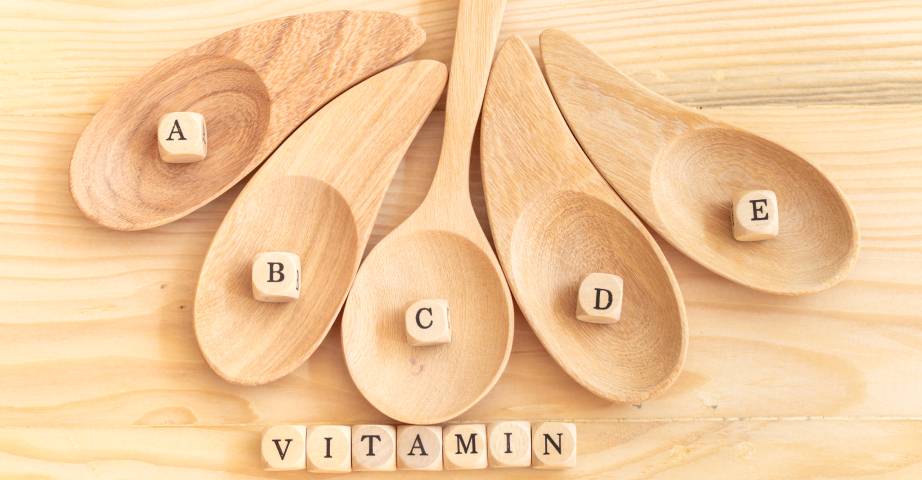Vitamin A, vitamin E - what is their role? When is it worth to supplement them?

Vitamin A, alongside vitamins D, E and K, is one of the fat-soluble vitamins that are not excreted in the urine but stored in the liver and body fat. The use of vitamin A and E increases protection against free radicals and has many other health benefits. Which ones? Where can you find vitamins A and E in your food, and when should you supplement them? You ask, we answer.
Vitamin A, vitamin E - key information
Vitamin A is also known as beta-carotene. It is a fat-soluble vitamin that is stored as retinol in the liver and fat tissue. The effects of vitamin A deficiency have been known for thousands of years - at that time night blindness was a common disease,, treated with ox liver extract.
Vitamin E is commonly known as the 'vitamin of youth'. It is an antioxidant that protects the body from oxidative stress and cell damage caused by free radicals. Other properties of vitamin E include preventing blood clots, supporting proper vision function and protecting red blood cells and gene expression. Vitamin E also regulates muscle performance and, along with folic acid, is essential for a healthy pregnancy.
Vitamin AE - role in the body
Vitamin A plays a very important role in the body. It supports the growth and development of bone tissue, as well as being essential for the proper functioning of sight and hormones production. Vitamin A strengthens the immune system, influences the proper functioning of cell membranes and protects the epithelium of the respiratory tract against microorganisms. It also keeps the skin, hair and nails in good condition.
Recommended products with vitamins A, and E
Vitamin A - anticancer benefits
Apart from the above-mentioned characteristics, vitamin A also has a potential anticancer effect, as it affects the growth and differentiation of epithelial cells, protection against free radicals, and may prevent cancerous transformation.
What gives vitamin A + E?
On the supplement market you can find products that consist of vitamin A and E. What does vitamin A + E do? Supplementing these two vitamins together increases protection against free radicals and as a result, slows down the ageing process.
Vitamins A plus E - Presence in food
Where does vitamin A+E appear naturally? Vitamin A can be found in large amounts in products such as:
- yams;
- eggs;
- kale;
- carrots;
- butter;
- milk and dairy products;
- fruit - cherries, apricots, peaches and plums;
- red peppers;
- tomatoes;
- spinach;
- fatty fish;
- animal liver and offal.
Meanwhile, the best sources of vitamin E are:
- sprouts;
- almonds;
- cereal seeds;
- cold-pressed vegetable oils;
- olive oil;
- hazelnuts.

What gives vitamin A + E? What is the danger of their deficiency?
Vitamin A is part of rhodopsin (the eye's retinal pigment) and is involved in the process of seeing. Because of this, one of the most common symptoms of vitamin A deficiency is night blindness, i.e. bad vision after dark.
Other symptoms of vitamin A deficiency are:
- nail brittleness and hair loss
- dry skin;
- acne;
- increased susceptibility to bacterial and viral infections;
- eczema;
- dryness of the cornea and conjunctiva of the eye;
- stunted growth.
Vitamin E deficiency is very dangerous during pregnancy, as it can lead to incorrect development of the baby, premature birth and even miscarriage. Other symptoms of vitamin E deficiency include:
- anaemia;
- pain, degeneration or even muscle atrophy
- problems with teeth and bones;
- chronic fatigue;
- keratosis and ageing of the skin;
- increased susceptibility to infections;
- neurological disorders.
Vitamins A plus E - who is most at risk of deficiency?
People who are most likely to be vitamin A deficient include:
- alcoholics and smokers;
- pregnant women;
- people (children and adults) with an unbalanced diet;
- people who work long hours at a computer;
- the elderly;
- people on restrictive diets;
- people with vitamin A malabsorption.
Meanwhile, people who are at risk of vitamin E deficiency in the body are:
- suffer from illnesses (congenital metabolic diseases such as fat malabsorption, congenital food intolerances such as coeliac disease, and genetic diseases such as Bassen-Kornzweig syndrome or cystic fibrosis may contribute to deficiencies).
- have a poor diet;
- follow restrictive diets.

Vitamin A plus E deficiencies can contribute to skin changes, epithelial and mucous membranes. They can also lead to the development of night blindness. These vitamins are essential for keeping the skin and immune system in good condition. They also inhibit the ageing processes, so if there is a deficiency of vitamin A and/or E, the diet should be analysed and modified. Sometimes deficiencies still occur despite a well-balanced diet - then it is worth considering additional supplementation.
Vitamin A + D in supplements
If your diet lacks foods that are the main source of vitamins A+E, or if you have experienced circumstances that make the absorption of these two vitamins difficult, you should consider supplementation. One of the products that can be used in such a situation is OstroVit ADEK, a complex preparation for people who have an increased demand for fat-soluble vitamins. Apart from vitamins A+E, it also contains vitamin D, which helps to keep bones and teeth healthy as well as regulates the functioning of muscles and the immune system. The product is also rich in vitamin K, which regulates blood clotting and is responsible for the proper transport of calcium from the blood to the bone tissue, keeping the bone system healthy.
Another recommended product is OstroVit Omega 3 + ADEK. This dietary supplement contains a set of fat-soluble vitamins: D, K as well as A plus E, additionally enriched with omega-3 fatty acids. Polyunsaturated fatty acids play an important role in the human body, as they influence the functioning of the brain and the organ of vision, support the cardiovascular system, and protect against cancer. OstroVit Omega 3 + ADEK is available in the form of easy to swallow capsules, taken immediately after a meal. It is recommended for people who care about their skin, hair, nails, and immune system. The use of this dietary supplement helps to strengthen bones and teeth, provides better mood and improves blood clotting.
Another vitamin worth checking out is OstroVit Witamina B Complex. This is a dietary supplement, which contains not only vitamin E but also B and C. Group B vitamins are responsible for the proper functioning of the nervous system, improve intellectual performance and have a positive influence on our mood. They also participate in many metabolic processes and support the functioning of the blood-forming and immune systems. Meanwhile, vitamin C is a powerful antioxidant that neutralises free radicals and slows down the ageing of the body.
Dietary supplements containing vitamin A plus E guarantee the proper functioning of the immune system and the organ of vision. The combined use of vitamins A and E results in a healthy skin condition, slowing down the ageing process as well as protecting against free oxygen radicals. These products are especially recommended during restrictive diets, increased physical activity, but also for people who lead an unhealthy lifestyle or follow an unbalanced diet.
When reaching for dietary supplements, please remember that these products cannot be used as a substitute (replacement) for a varied diet. It is recommended to have a balanced diet and healthy lifestyle, as well as using them in doses specified by the producer. Before purchasing a product, check its possible contraindications – some products should not be consumed by people taking anticoagulants (due to their antagonistic effect on vitamin K).

